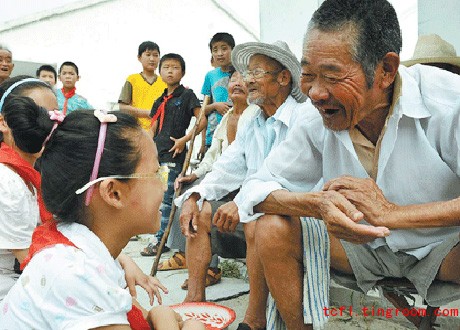新修订的《老年人权益保障法》7月1日起实施,其最受关注的内容是明确规定了与老年人分开居住的家庭成员,应当经常看望或者问候老年人,否则将构成违法。
该法的通过是为了维护60岁以上老年人的合法权益,并传承中国传统的孝道。

A student from Wangji Primary School in Jiangsu province chats with an elderly man on Sunday. More than thirty students visited the home for the elderly as part of the "filial morality comes first" program. [Photo: China Daily]
关键词解析:
“孝道”就是Filial piety,由儒家创始人孔子提出,并提倡“百善孝为先”(filial piety is one of the virtues to be held above all else),强调照顾、尊敬并顺从父母之责(the responsibility to care for, respect, and obey parents)。
新法规定,家庭成员应当关心老年人的精神需求(psychological needs),与老年人分开居住的家庭成员,应当经常看望或者问候老年人(visit them or send greetings on a regular basis),也就是“常回家看看”。新法同时指出,国家将把老龄人口(aging population)问题作为长期国策(long-term national strategy)的一部分来应对。
相关英文报道:
An amended law that requires children to regularly visit their aging parents has been welcomed by many, but some said it will be just symbolic.
Family members should care about the psychological needs of their older relatives, and should visit them or send greetings on a regular basis, according to the law on protecting the rights and interests of the elderly, which came into effect on Monday.
The law was passed to protect the lawful rights and interests of parents aged 60 and older, and to carry on the Chinese virtue of filial piety.
 English
English Japanese
Japanese Korean
Korean French
French German
German Spanish
Spanish Italian
Italian Arab
Arab Portuguese
Portuguese Vietnamese
Vietnamese Russian
Russian Finnish
Finnish Thai
Thai dk
dk